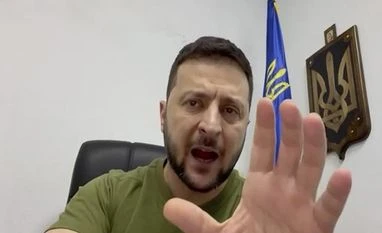After last week's large-scale Russian attack that disconnected Ukraine's all four nuclear power plants and other major power facilities from the grid, President Volodymyr Zelenksy warned that Moscow is "preparing new strikes" and the coming days "may be difficult".
In his nightly video address to the nation on Sunday, he said: "We understand that terrorists are preparing new strikes and as long as they have missiles, they won't stop.
"The upcoming week can be as hard as the one that passes. Our Defence Forces are preparing. The whole state is preparing. We work out all scenarios, including with partners."
Zelensky also urged the people to "please pay attention to the air alerts during the week".
He further as of Sunday evening, most regions in Ukraine were having only rolling power cuts, adding that "the situation is under the control of the energy authorities".
The President noted that the situation at the front remains "very difficult", especially in the Donetsk region.
Also Read
The latest warning comes days after Russia launched another large-scale missile attack on Ukraine's critical infrastructure on November 23, which also led to the deaths of 10 people.
Ukraine's anti-aircraft defence systems shot down 51 out of 70 Russian cruise missiles and five kamikaze drones, Ukrayinska Pravda reported.
The attack resulted in temporary power outages at all nuclear power plants and most thermal and hydroelectric power plants, while power transmission facilities were also damaged.
Due to the widespread power outage, water and heat supply to households was also interrupted.
The continued Russian attacks have damaged almost half of Ukraine's energy system and millions of people are without power as temperatures drop for winter.
Blackouts, both scheduled and unscheduled, have become common in many parts of Ukraine, as Russia aims regular waves of missile attacks at parts of the energy infrastructure.
At least seven people were killed and more than 20 million others were left without electricity on November 8 when Russia carried out over a 100 missile strikes in what is believed to be Moscow's biggest wave of missile strikes since the invasion began on February 24.
--IANS
ksk/
(Only the headline and picture of this report may have been reworked by the Business Standard staff; the rest of the content is auto-generated from a syndicated feed.)
)